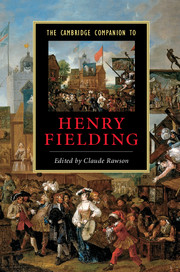Book contents
- Frontmatter
- Introduction
- 1 Henry Fielding’s life
- 2 Fielding’s theatrical career
- 3 Shamela
- 4 Joseph Andrews
- 5 Jonathan Wild
- 6 Tom Jones
- 7 Amelia
- 8 Fielding’s periodical journalism
- 9 Fielding and female authority
- 10 Fielding on society, crime, and the law
- 11 Fielding’s style
- 12 Fielding’s afterlife
- Guide to further reading
- Index
- Series List
3 - Shamela
Published online by Cambridge University Press: 28 July 2007
- Frontmatter
- Introduction
- 1 Henry Fielding’s life
- 2 Fielding’s theatrical career
- 3 Shamela
- 4 Joseph Andrews
- 5 Jonathan Wild
- 6 Tom Jones
- 7 Amelia
- 8 Fielding’s periodical journalism
- 9 Fielding and female authority
- 10 Fielding on society, crime, and the law
- 11 Fielding’s style
- 12 Fielding’s afterlife
- Guide to further reading
- Index
- Series List
Summary
Shamela was the first and most famous parody of Richardson’s Pamela, but Fielding never acknowledged having written it. Nor did those who studied and wrote of Fielding for the next century and a half show any more inclination to claim it for him, despite the signs of his authorship which lay here and there in plain sight, and only within the past sixty years has it really been shown to be his. Yet there is nothing dubiously recent about this attribution, which is not so much the invention of a latter day as the willing forgetfulness of a former. It was Fielding himself who first studied to forget his title to this work, for though it was cheerful and brilliant, it was very low. Joseph Andrews and Tom Jones had that mark upon them too, but only from the low scenes or characters they descended to treat: or in other words only because they were stooping to truth. To that meritorious form of the low Fielding would gladly claim the title, mocking the bigotry of critics and taunting them with their own cant word itself of 'low'. But Shamela was another matter. There it is not the vulgar story but the vulgar tone - Shamela’s tone - that engrosses the work and puts it beyond respectable ownership. Whatever Shamela talks of she cheapens, with an effortless spirit and charm uncalculated by her but on Fielding’s part very carefully calculated to please and to frustrate disapproval. She is indulged so freely and so sympathetically by her creator that no pretence of condemnation, no postscripted report of her having been caught in bed with Williams and turned out of her house, can make it seem that she is not also beloved of her creator, or that all this comic indecency from her does not simply amount to indecent comedy from him.
- Type
- Chapter
- Information
- The Cambridge Companion to Henry Fielding , pp. 38 - 49Publisher: Cambridge University PressPrint publication year: 2007

